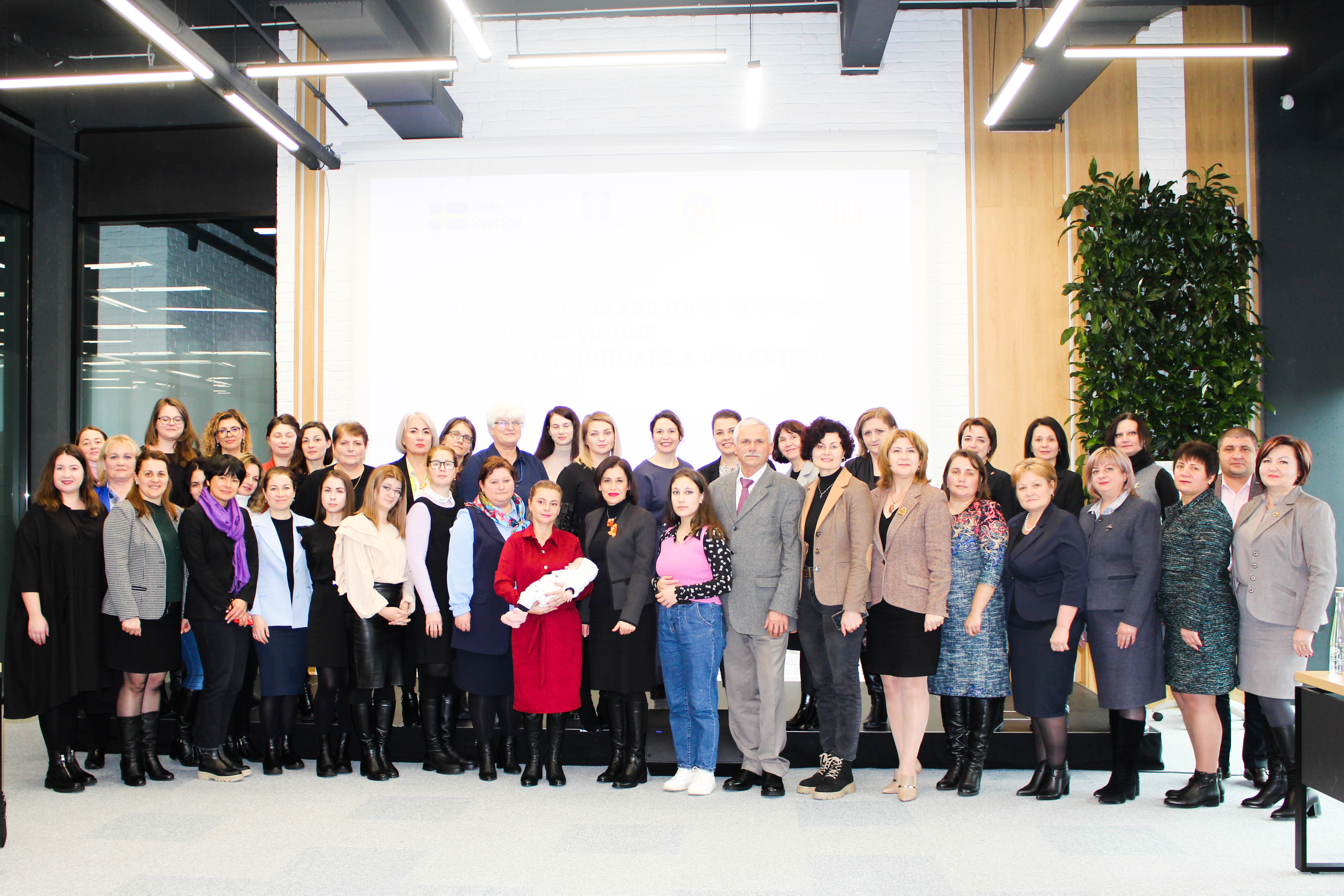Roundtable focuses on economic empowerment pilot programme for domestic violence survivors
Date:
Around 290 survivors of domestic violence benefited from economic empowerment programmes in five pilot districts. Women from Soroca, Bălți, Hîncești, Telenești and Ștefan-Vodă participated in vocational orientation workshops on business and employment opportunities. They were supported by mentors to develop their own business plans and learned from peer-to-peer sessions.

The piloted programmes aim to provide the survivors with a full cycle of support focused on employment and business development, entrepreneurial capacity building and psychological counseling. An extremely important aspect of these programmes is the collaborative efforts being undertaken by the National Agency for Social Assistance, the National Employment Agency and other relevant institutions to ensure employment for survivors of domestic violence.
At a roundtable presenting the results of the programme, Valentina Lungu, the Deputy Director of the National Employement Agency, explained that representatives of state institutions must ensure that people have access to employment services, including those who have suffered from domestic violence. “I agree that it is necessary to scale up these practices at a national level,” she said. “We need to establish closer relations with the territorial sections of social assistance and work as closely as possible to the beneficiaries".
Dominika Stojanoska, UN Women Moldova’s Country Representative, said that the roundtable is not only important for UN Women but also for all organisations involved. “We must recognise that one of the factors perpetuating domestic violence is the economic dependence of women who go through abuse,” she said, explaining that survivors often don’t have an “exit” because of their financial independence. “An extremely important aspect when drafting the economic empowerment programmes is to have coherence and to interconnect the state institutions responsible for providing adequate support and services. We have successful models but also models that we can learn more from. I am glad we are at the stage where we have completed the piloting of these programmes and that we can take into account, for the next stage, both the needs of the beneficiaries and the system, so that what we scale up has a complex response".
Pernilla Nordvall, Second Secretary of Political Affairs at the Embassy of Sweden in Chișinău, explained that domestic violence is not an individual problem but a structural one that requires joint efforts from the entire society. “Gender equality is not only a concern of women, it is a matter of human rights because toxic masculinity affects men as well,” she said. “To enter the labor market, girls and women need to access quality educational programmes, see examples of other women who have succeeded and understand that defending your rights is a normality”.
Mariana Buruiană, Executive Director of the Women's Law Center, said that economic empowerment is crucial to the state's response to preventing and combating domestic violence and creating and supporting specialised services, especially in the context of the Istanbul Convention. “Creating these economic empowerment programmes was an expertise exercise and a process in participatory, strategic, long-term thinking,” she said. “For us, as a daycare center that directly provides support to the beneficiaries, it is important to take their needs into account and ensure that our services correspond to the particularities of this group of women".
The roundtable was also attended by beneficiaries of the programmes as well as representatives of women entrepreneurs in different regions, who talked about the difficulties they have encountered while trying to become financially independent. One beneficiary shared: "I went through all the circles of hell – that's how I felt at that time. I realised that I didn't have enough financial sources to move forward on my own. I didn't have the money to pay for the services of a lawyer when I initiated my divorce. And that made me start a business. I have benefited from the services of a Business Incubator and launched an educational center where I offer English classes. This allowed me to bring more stability to my life and to help other girls and women who ask for my advice".
”The roundtable was organised to mark the completion of "Support to the co-creation of economic empowerment programmes for women survivors of gender-based violence," a programme implemented by the Women's Law Center in partnership with the Ministry of Labor and Social Protection, with the support of UN Women Moldova and financial support from the Government of Sweden.